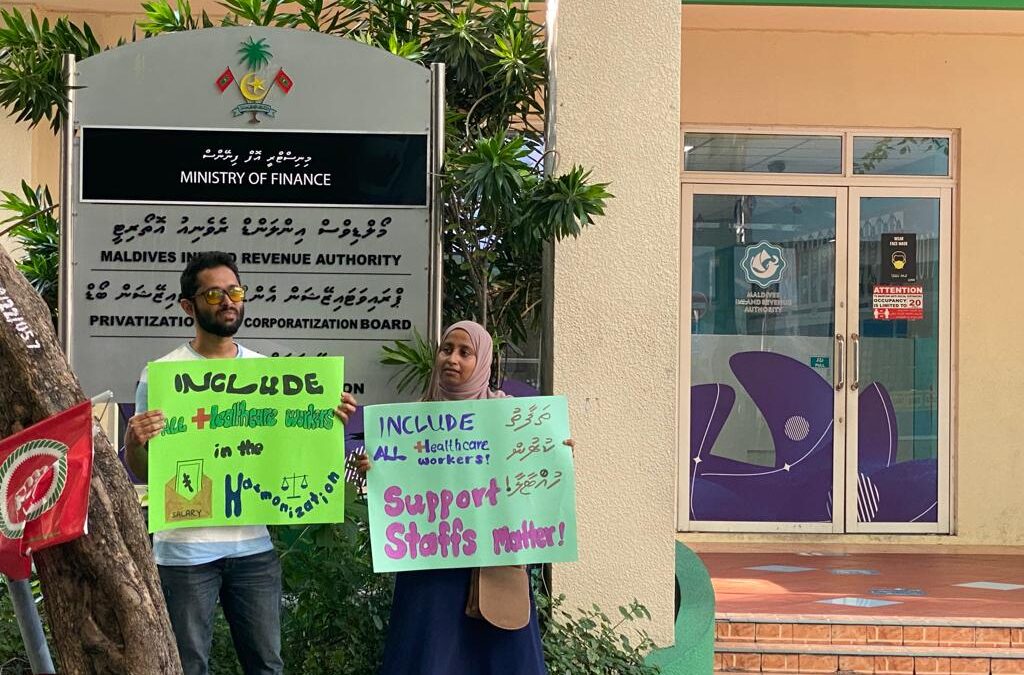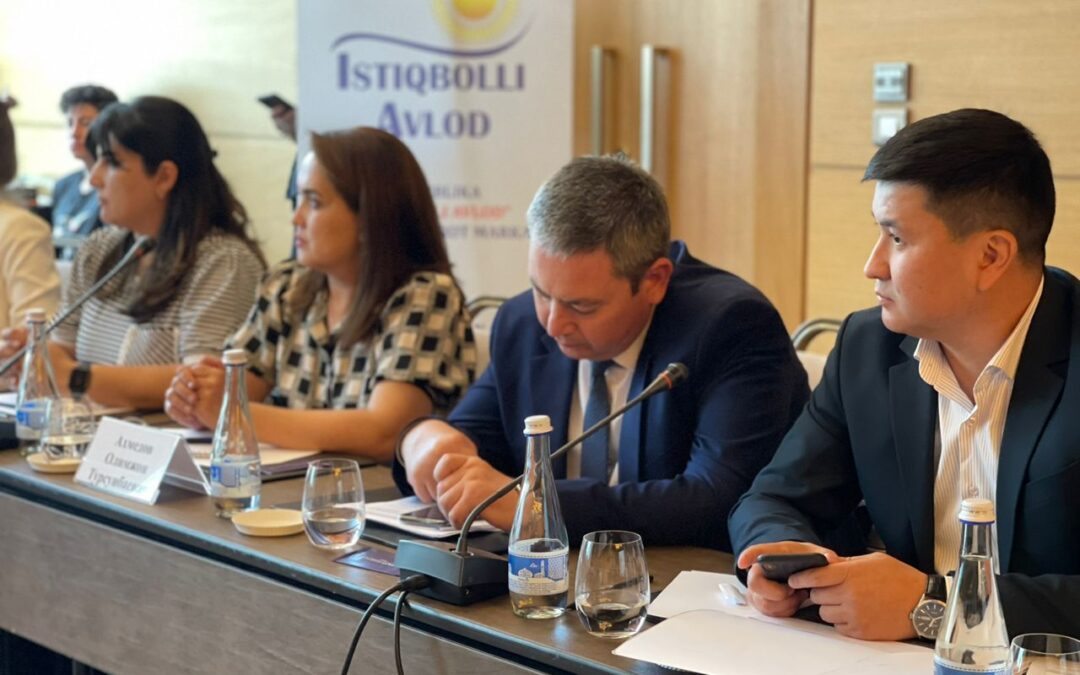
Maldives Health Care Workers Win Paid Overtime
Health care workers working in the public sector throughout the Maldives will now receive overtime pay in full for all public holidays, resulting from a robust campaign spurred by the Maldives Health Professionals Union (MHPU).

A health care worker holds a sign stating: “Wage theft is a crime–Pay overtime wages.” Credit: MHPU
The new amendment, approved at the end of March, covers all 9,000 government health care workers and removes a 10 percent cap on salary for public holidays. Paid overtime includes all public holidays, such as Fridays, which are part of the official weekend in the Maldives Solidarity Center, an MHPU partner, has provided advocacy and organizing support.
“This recent change, achieved through the relentless efforts of many dedicated individuals, marks a significant step toward ensuring health care workers receive the compensation they rightfully deserve for their tireless commitment,” says Ramsha, a public health program officer.
Staffing shortages have meant nurses and many health care employees regularly work between 40 and 60 hours of overtime each month—all with no pay. Under the new amendment, workers will be compensated if they are assigned extra hours of work during public holidays.
The health care workers often work extra hours beyond their regular schedule, sacrificing their personal and family life. The recent amendment protects wages—- especially during public holidays—and provides additional income protections in the struggling economy.
“They were compelled to work because of shortages,” says Fathimath Zamnia, MHPU general secretary. “Many are kept on call 24/7 and some work 12 hours, with no adequate rest between the next shift.” Hours standing to care for patients resulted in young workers using pain-relief patches, undergoing spinal surgeries and often suffering from chronic illness, adversely affecting families.
“Health care workers are highly service-oriented and often make significant sacrifices,” Zimna says.
Health care workers say that while the amendment does not address all issues related to overtime, “we want to ensure that all workers are safeguarded against unpaid forced labor, as it directly impacts both patient care and life beyond work of the individual.”
Solidarity Center Builds New Strategies
Solidarity Center has played a vital role in providing training and technical assistance to partner unions, including MHPU in the Maldives. The successful overtime campaign reflects the new strategies Zimna and the union gained in both the Solidarity Center’s Global Labor Leadership Institute and Global Organizing Institute. Their new focus facilitated unions to build a grassroots structured organizing campaigns focused on strategies that educate and mobilize workers to build collective power.

“We want to ensure that all workers are safeguarded against unpaid forced labor”–Fathimath Zimna. Credit: Solidarity Center / Mollie Relihan
The public campaign included media coverage in newspapers, involving agitating workers through social media to highlight their struggles. As more workers became involved on Facebook and X (Twitter), two common platforms, more workers reached out using the union hashtag, with their friends and relatives joining.
The healthcare workforce continues to face multiple issues in their working environments, “We are dedicated to strengthening workers’ collective power and continuously striving to achieve better working conditions and improved quality of care,” Zimna says.
Bolstering Worker Wins
Bolstering fundamental democratic principles such as decent wages and safe working conditions, the Maldives Trade Union Congress (MTUC) and MPHU began a years-long struggle for passage of the Industrial Relations Act in 2024, which, with its emphasis on the protection of worker rights, unions say paves the way for economic and social progress.
“The Solidarity Center was a huge partner in the campaign in passing two very crucial [pieces of] legislation,” says Zimna. “The legal proceedings of the campaign were handled by the Public Interest Law Centre, which also was supported by the Solidarity Center. By providing technical and strategic support, Solidarity Center also assisted in conducting training sessions and running educational programs for workers.”
As the union builds the campaign around critical issues facing workers, the Industrial Relations Act provides provisions that “create an enabling environment to form unions, organize workers and achieve collective agreements across all sectors in the Maldives,” Zimna says. In addition, unions succeeded in passage of a Occupational Safety and Health bill that underscores stringent obligations for employers, emphasizing workplace safety standards, compensation frameworks and penalties for non-compliance.
“I feel this is a great win for the union workers. Our rights have been neglected for so long, but we have come so far through our work within the union,” says Shifana Ali, a medical laboratory assistant and active participant in the campaign.
Over the past five years, MHPU, a Solidarity Center partner, has received essential support in advocacy and organizing efforts.
“Workers in the Maldives often are challenged with low wages and poor working conditions,” Zimna says. “A majority of workers in Maldives are migrants, and the growing workforce often is exploited and exposed to unsafe conditions.
“The experiences that we share are similar—as with many workers around the world, the solution lies in organizing workers and building our collective power to resist, fight and win for the workers. We are strongly committed to organizing workers in the Maldives.”

